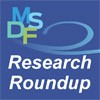MS Research Roundup: July 9, 2014
Daclizumab Phase 3 Findings; New PLOS Clinical Immunology Collection; FDA Proposes Social Media Guidelines; #Hashtag Humor
MS Research Roundup collects items of interest to multiple sclerosis researchers from around the Web. Send us your tips: tips@msdiscovery.org.
Daclizumab Phase 3 Findings
 In positive results that merit a chat with regulatory agencies about the timeline for filing for regulatory approval, a large-scale, phase 3 trial suggested that daclizumab high-yield process (DAC HYP), an experimental immune-modulating therapy injected every 4 weeks, reduced relapses and disease activity significantly more than did a weekly injection of interferon β-1a (Avonex, Biogen Idec) in people with relapsing MS over 2 to 3 years. The preliminary results from the DECIDE study were announced in a June 16, 2014, press release by Biogen Idec and AbbVie. The companies say they will present more detailed results at a future medical conference. They report a consistent safety profile with previous studies, including a slight increase in serious infections and one death, which they consider unrelated to the treatment. The drug’s effectiveness may be telling researchers something interesting about MS, because the drug seems to increase natural killer cells, which also have an antiviral response, wrote Gavin Giovannoni, MBBCh, Ph.D., from Barts and the London School of Medicine and Dentistry, in a blog post about a phase 2 extension study of daclizumab he and his co-authors published March 19, 2014, in The Lancet Neurology. “A rigorous safety monitoring program will need to be implemented should daclizumab HYP be prescribed in clinical practice,” wrote the authors of an accompanying commentary on the extension study. Originally approved in 1997 for quelling rejection of transplanted kidneys, daclizumab also exposed another type of innate lymphoid cell (LTi) as a wrongdoer and potential target in MS. (AbbVie, ClinicalTrials.gov, Multiple Sclerosis Research blog, NMSS)
In positive results that merit a chat with regulatory agencies about the timeline for filing for regulatory approval, a large-scale, phase 3 trial suggested that daclizumab high-yield process (DAC HYP), an experimental immune-modulating therapy injected every 4 weeks, reduced relapses and disease activity significantly more than did a weekly injection of interferon β-1a (Avonex, Biogen Idec) in people with relapsing MS over 2 to 3 years. The preliminary results from the DECIDE study were announced in a June 16, 2014, press release by Biogen Idec and AbbVie. The companies say they will present more detailed results at a future medical conference. They report a consistent safety profile with previous studies, including a slight increase in serious infections and one death, which they consider unrelated to the treatment. The drug’s effectiveness may be telling researchers something interesting about MS, because the drug seems to increase natural killer cells, which also have an antiviral response, wrote Gavin Giovannoni, MBBCh, Ph.D., from Barts and the London School of Medicine and Dentistry, in a blog post about a phase 2 extension study of daclizumab he and his co-authors published March 19, 2014, in The Lancet Neurology. “A rigorous safety monitoring program will need to be implemented should daclizumab HYP be prescribed in clinical practice,” wrote the authors of an accompanying commentary on the extension study. Originally approved in 1997 for quelling rejection of transplanted kidneys, daclizumab also exposed another type of innate lymphoid cell (LTi) as a wrongdoer and potential target in MS. (AbbVie, ClinicalTrials.gov, Multiple Sclerosis Research blog, NMSS)
Clinical Immunology United
Open-access publisher PLOS journals has started a Clinical Immunology Collection that assembles topical papers online from its seven journals. The collection launched last month with sections on Allergies & Anaphylaxis and Tumor Immunology. Other sections will be added in the coming weeks, including Autoimmune Conditions. The collection was announced last month in Chicago at the annual meeting of the Federation of Clinical Immunology Societies (FOCIS). Mei Yan Leung, PLOS product manager for immunology, says a Basic Immunology collection is also in the works. Papers should continue to be submitted to the individual journals. (FOCIS, PLOS Collections)
Tweet This, Not That
To promote or defend drugs on social media, companies must balance risks & benefits, use brand & generic names, & use exact indications. That’s our tweet-length summary of the two proposed social media guidelines issued last month by the U.S. Food and Drug Administration (FDA). One guidance applies to company-endorsed content on character-limited Internet platforms, such as Twitter and sponsored links. The other deals with correcting independent misinformation, both good and bad, on Internet platforms ranging from Wikipedia to blogs. The long-awaited proposals follow a 2009 public hearing, but the pace is picking up. Public comments are due by September 16. And only hours after a tweet announcing an hourlong webinar to answer questions about the guidelines at 2 p.m., Thursday July 10, the FDA closed registration due to reaching maximum capacity. If you’re not one of the lucky 1000 who got in, MSDF will live-tweet the event and the FDA will post the slides soon after. Even with their questions answered, companies may still avoid Twitter, several observers speculated. (Eye on FDA blog, FDA, Pharmalot blog/Wall Street Journal, Policy and Medicine blog/Rockpointe, Reuters, The Onion)
#YoManuscript Is So Bad …
Sharpen your wits and blow off some steam with our favorite Twitter hashtags related to the daily slog of science: #sixwordpeerreview , #yomanuscipt, #methodswedontreport, and #overlyhonestmethods. One favorite of tweeters:
#YoManuscript is so bad the null hypothesis rejected *it*.
— Jason Priem (@jasonpriem) April 13, 2014Amusing as they are to read and write, at least one of them has a more serious purpose. Micah Allen @neuroconscience says he “started #methodswedontreport to try and get an idea of the serious and silly practice we do during data collection” that makes replication of studies difficult. Please share your favorite hashtags—or tweets—in our comments section below. Let the hilarity ensue. (Twitter)
Gavin Giovannoni, MBBCh, Ph.D., is a member of the MSDF Scientific Advisory Board.
Read other MS Research Roundups.


